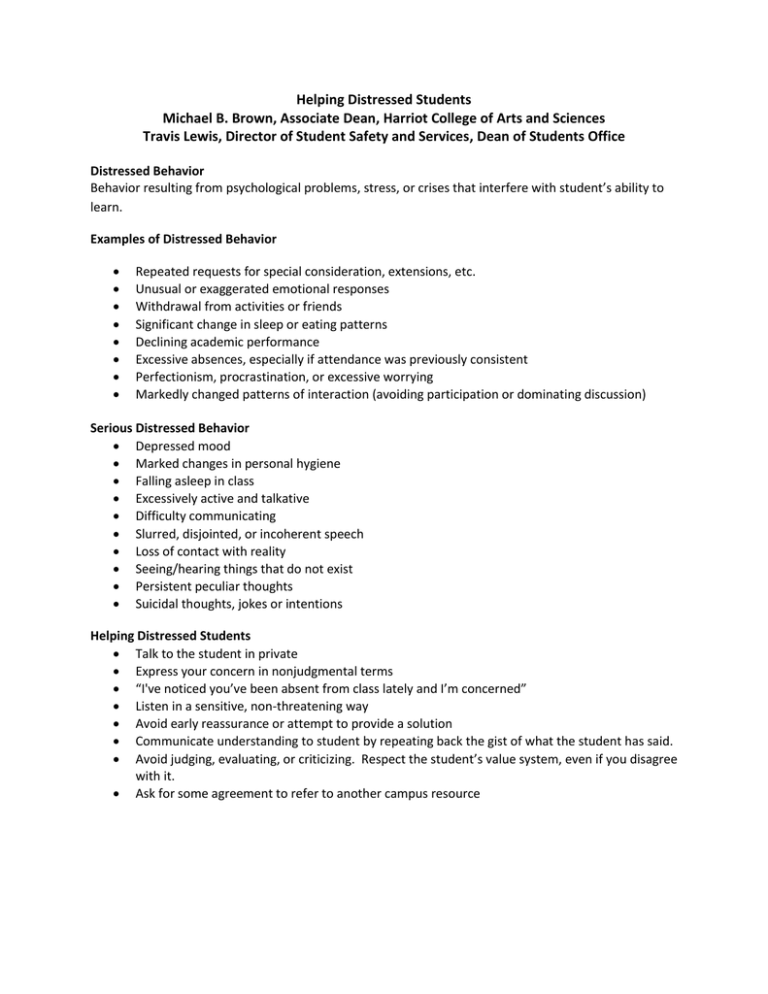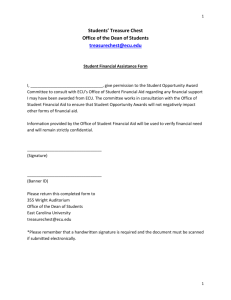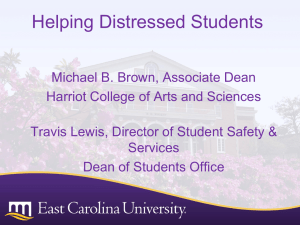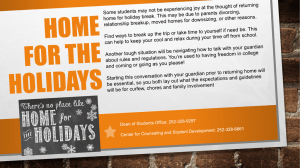Helping Distressed Students
advertisement

Helping Distressed Students Michael B. Brown, Associate Dean, Harriot College of Arts and Sciences Travis Lewis, Director of Student Safety and Services, Dean of Students Office Distressed Behavior Behavior resulting from psychological problems, stress, or crises that interfere with student’s ability to learn. Examples of Distressed Behavior Repeated requests for special consideration, extensions, etc. Unusual or exaggerated emotional responses Withdrawal from activities or friends Significant change in sleep or eating patterns Declining academic performance Excessive absences, especially if attendance was previously consistent Perfectionism, procrastination, or excessive worrying Markedly changed patterns of interaction (avoiding participation or dominating discussion) Serious Distressed Behavior Depressed mood Marked changes in personal hygiene Falling asleep in class Excessively active and talkative Difficulty communicating Slurred, disjointed, or incoherent speech Loss of contact with reality Seeing/hearing things that do not exist Persistent peculiar thoughts Suicidal thoughts, jokes or intentions Helping Distressed Students Talk to the student in private Express your concern in nonjudgmental terms “I've noticed you’ve been absent from class lately and I’m concerned” Listen in a sensitive, non-threatening way Avoid early reassurance or attempt to provide a solution Communicate understanding to student by repeating back the gist of what the student has said. Avoid judging, evaluating, or criticizing. Respect the student’s value system, even if you disagree with it. Ask for some agreement to refer to another campus resource When to Make a Referral The student is in crisis The behavior is beyond your skill level The behavior persists The behavior is getting worse You feel overwhelmed or unsure of how to proceed You feel the need to talk with someone about your observations or concerns NEVER HESITATE TO SEEK CONSULTATION ABOUT A STUDENT!! How to Make a Referral Summarize your observations about the student’s behavior Express your concern about the student’s distress Assure the student that seeking help does not mean they are “crazy” Make phone call from your office to help student make an appointment with referral resource Make sure student in crisis gets help now Resources for Assistance Counseling & Student Development 328-6661 Student Health Services 328-6841 Student Rights & Responsibilities 328-6824 Dean of Students Office 329-9297 ECU Cares 737-5555 ECU Police 9-1-1 or 328-6787 (non-emergency) Academic resources (Pirate Tutoring Center, advisors, department chairs and associate deans) ECU Cares Reporting system to get assistance for persons with behaviors of concern Not a replacement for emergency responders!! Operated by Dean of Students Office Reports can be anonymous ECU Cares phone line: 737-5555 Web reporting form: www.ecu.edu/dos



